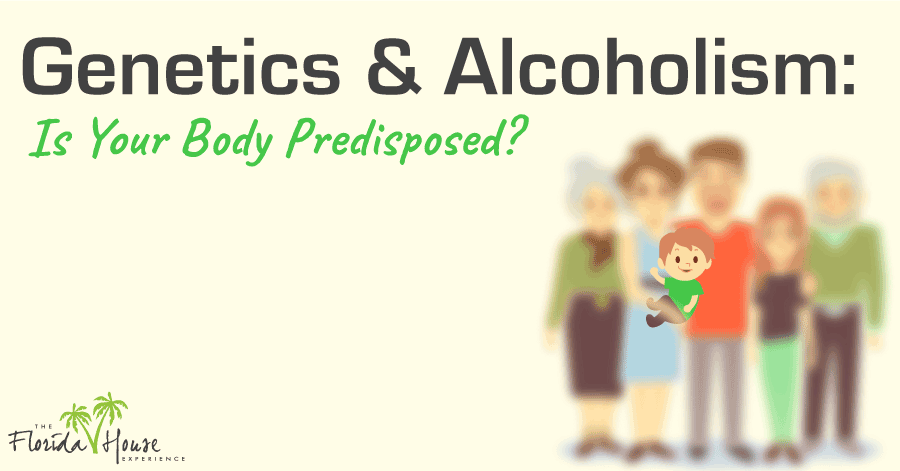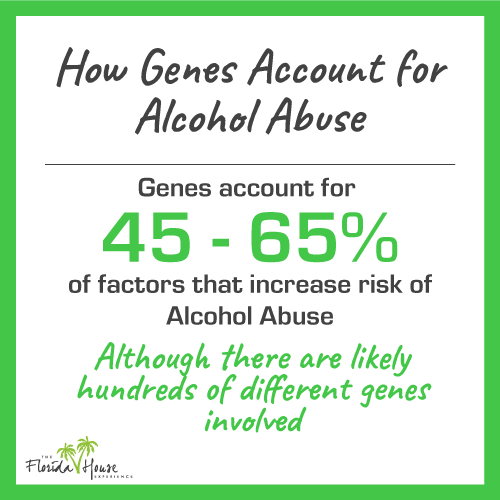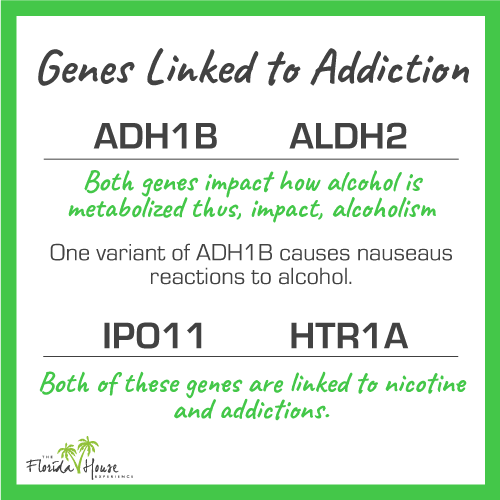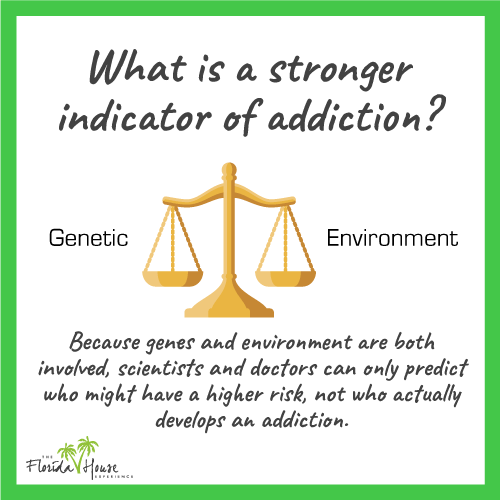
The question of whether genes or environment are responsible for alcoholism has long been debated, but the answers aren’t as clear-cut as popular media often makes it seem. While alcohol abuse does often run in families, specific genes for alcoholism haven’t been identified, and the link between biology and alcohol abuse isn’t direct.
Genetic Research on Alcoholism
 Many scientists think there may be a genetic component to alcoholism, but the exact relationship remains under study. Children and siblings of someone with an alcohol abuse disorder are more likely to develop one themselves. For people raised by someone other than a biological parent, alcoholism in the biological parent raises the risk more than alcoholism in the adoptive parent. According to twin studies, genes account for about 45 to 65 percent of the factors that can increase the risk of alcohol abuse. There are likely hundreds of different genes involved in alcoholism and addiction, so any two people might have completely different gene profiles but still have a similar level of risk.
Many scientists think there may be a genetic component to alcoholism, but the exact relationship remains under study. Children and siblings of someone with an alcohol abuse disorder are more likely to develop one themselves. For people raised by someone other than a biological parent, alcoholism in the biological parent raises the risk more than alcoholism in the adoptive parent. According to twin studies, genes account for about 45 to 65 percent of the factors that can increase the risk of alcohol abuse. There are likely hundreds of different genes involved in alcoholism and addiction, so any two people might have completely different gene profiles but still have a similar level of risk.
The Biological Effects of a Genetic Predisposition for Alcoholism
Genes don’t act alone in the body. They’re basically the instruction set that tells the cells how to form and operate. Genes associated with addiction do a variety of different things in the body. Some of the biological effects of alcoholism-associated genes include:
- A set of specific genes is associated with both alcoholism and a smaller amygdala, the part of the brain that affects cravings and emotions.
- Genes associated with alcoholism may affect the levels of serotonin in the brain. Serotonin regulates mood.
- The number of dopamine receptors in the brain may affect the likelihood of developing alcoholism. Genes associated with higher levels of dopamine receptors in the prefrontal cortex, the part of the brain that helps you control emotions and make behavioral decisions, may protect people with those gene variants from forming an addiction.
Specific Genes Associated with Alcoholism
 While there is no specific single gene for alcoholism, researchers have identified a few genes that could alter a person’s risk of developing alcoholism. The genes ADH1B and ALDH2 are involved with alcohol metabolism, and variations of these genes may make people more or less susceptible to developing alcoholism.
While there is no specific single gene for alcoholism, researchers have identified a few genes that could alter a person’s risk of developing alcoholism. The genes ADH1B and ALDH2 are involved with alcohol metabolism, and variations of these genes may make people more or less susceptible to developing alcoholism.
One particular variant of ADH1B increases uncomfortable side effects caused by alcohol, such as flushed skin and nausea, which makes people with that version less likely to become dependent. There may also be genes that interact to alter how much a person enjoys alcohol and how sensitive the person is to the effects of alcohol. Genes that affect withdrawal sensitivity could also alter the likelihood of developing alcoholism.
In some cases, genes might make a person more susceptible not just to alcohol addiction but to addictive behaviors in general. For example, the genes IPO11 and HTR1A are linked to both alcohol and nicotine addictions. Sometimes genes involved in impulsive behavior and dealing with stress could affect a person’s likelihood of becoming addicted to alcohol. Genes for mental illnesses could also influence the likelihood of a person to use and abuse alcohol.
Other genes have been tied to alcohol addiction in animal studies but haven’t been fully researched in humans yet. In mouse studies, mutations in GABA receptor genes make the rodents prefer alcohol over sugar water and cause the mice to develop addictions. These genetic mutations cause the brain to have a stronger reward response than usual when exposed to alcohol. Some GABA receptor genes have also been linked to addictive behaviors in humans, but further research is needed to see if the biological effects are the same as they are in mice.
Environmental Impact on Developing Addiction
 Having genes that make you more susceptible to alcohol abuse doesn’t mean you’re destined for a life of addiction. Many relatives of alcoholics, including children and siblings of alcoholics, never develop alcoholism themselves. The environment also plays a large effect in who develops addictions. Some specific environmental situations known to increase the risk of developing a substance abuse addiction include:
Having genes that make you more susceptible to alcohol abuse doesn’t mean you’re destined for a life of addiction. Many relatives of alcoholics, including children and siblings of alcoholics, never develop alcoholism themselves. The environment also plays a large effect in who develops addictions. Some specific environmental situations known to increase the risk of developing a substance abuse addiction include:
- Living in an abusive situation, including growing up with child abuse or living with an abusive spouse or partner
- Drinking early in life, such as during adolescence and the teen years
- Frequent drinking or binge drinking, which includes drinking more than five drinks per day
- Having a concurrent mental health issue, such as depression, anxiety disorders or bipolar disorder
Because genes and environment are both involved, scientists and doctors can only predict who might have a higher risk, not who actually develops an addiction. Some people with alcoholism-associated genes never become addicted, and people without any of the gene variants associated with addiction sometimes become alcoholics anyway.
Specific environmental circumstances during childhood can also be protective, despite the possible presence of genes that increase risk. Children of alcoholics who maintain regular routines, such as consistent family meal times, are at lower risk of developing alcoholism than children of alcoholics who don’t maintain a consistent home environment.
The environment also affects how genes are expressed, so exposure to stress or frequent drinking can alter gene expression in the brain and make alcoholism more likely. Scientists have found at least 772 genes in the amygdala that are altered by alcohol use, and some of these genes may make the person more vulnerable to developing an addiction.
Using Genetic Information to Combat Alcoholism
The genetic links to addiction are important not for predicting alcoholism in individuals but for helping identify high-risk groups and developing treatment plans. Scientists who study the connection between genes and alcohol abuse can use that information to plan early interventions or to find new ways to treat addiction and ease withdrawal symptoms. As an example, one specific gene variant has been identified that makes people with alcoholism respond better to the drug naltrexone, which is used to reduce alcohol cravings during recovery.
The combination of genetic and environmental factors as causes of addiction means that treatment generally takes on multiple forms. Even someone who has specific genes associated with addiction can successfully undergo treatment.
If you or a family member has been affected by alcohol abuse or addiction, contact FHE Health to learn about treatment options that could put you on the path to recovery.






